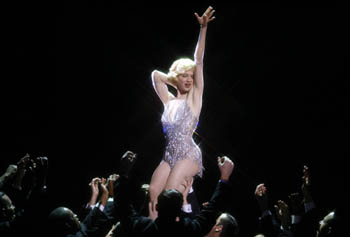![[Metroactive Movies]](/movies/gifs/movies468.gif)
[ Movies Index | Show Times | Silicon Valley | Metroactive Home | Archives ]
|
Buy the 'Chicago' movie soundtrack.
|

Can't Dance, Don't Ask Me: Renée Zellweger gives it the old college try but proves to have two left feet in 'Chicago.' Slipping a Gere Rob Marshall's 'Chicago' is tin-eared and lead-footed A STAGE-STRUCK, half-bright girl named Roxie Hart (Renée Zellweger) commences the film Chicago by shooting her lover. In prison, she meets her idol, the nightclub star Velma Kelly (Catherine Zeta-Jones looking authentically troublesome in her Louise Brooks coif). The dark-haired murderess becomes Roxie's jailhouse rival. Both compete for the services of Chicago's best criminal lawyer, Billy Flynn (Richard Gere). The silver-tongued mouthpiece is an expert at playing the press against the courts; through the crass lawyer's help, Roxie becomes a nine-day wonder in the newspapers. Chicago, which was staged on Broadway in 1975, is based on the vintage 1942 screwball comedy Roxie Hart. Here, the words-and-music team of John Kander and Fred Ebb, who did Cabaret, repeat their own formula to less enchanting results. Just as Cabaret had its MC, Chicago has a bandleader, Taye Diggs, who introduces the episodes. In the mid-'70s, making a musical about venal, self-involved men and women was practically an avant-garde idea; so was the gesture of staging half the show in a dimly lighted jailhouse. The overemphatic style of Chicago, meant for a political theater, looks bludgeoning onscreen. The film is not a waste of time. The easy-to-select highlight is Queen Latifah, who plays a prison matron who swaggers through the Bessie Smith-style number "When You're Good to Mama." Latifah is the woman Mae West was always dressing up to be. The chorus girls' number, "Cellblock Tango," unsettles with its Dadaesque intro: the prisoners, at night, recount the murders they committed, as if talking in their sleep. They twist themselves into the angular, splayed Expressionist spasms that made Chicago's original choreographer, Bob Fosse, famous. Still, director Rob Marshall, a TV veteran with TV-trained aesthetics, cuts restlessly, even when there's nothing really to cut to. And he's saddled the picture with three leads who aren't commanding singers. Gere does his big sequin-jacketed number, "Razzle Dazzle," in a vocal honk, like the megaphone singers of the 1920s. Seeing Zeta-Jones and Zellweger together, the latter with her Bridget Jones plumpness starved off, I had hoped for something like the brash title sequence of Gentlemen Prefer Blondes: a contrast of girl-power styles, between blonde fluffiness and brunette ballsiness. Unfortunately, the two female leads are less like dancers than synchronized walkers; they've been coached just about to the point where they can do a Charleston. And these stars don't take five dance steps without an edit. More and more I'm beginning to suspect that what killed the musical was the introduction of 1960s fast-editing styles. What revs up the energy in a thriller or a modern love story doesn't function as well during a musical number. Fast cutting takes away the slow build of a song's power; it tries to turn every jazz tune into a rock concert. It's useless; rock fans are never going to care for this kind of music and dancing no matter how it's sliced.
Chicago (PG-13; 107 min.), directed by Rob Marshall, written by Maurine Dallas Watkins, Fred Ebb, Bob Fosse and Bill Condon, photographed by Dio Beebe and starring Richard Gere, Renée Zellweger and Catherine Zeta-Jones, opens Friday at selected theaters valleywide.
Send a letter to the editor about this story to letters@metronews.com. [ Silicon Valley | Metroactive Home | Archives ]
|
From the January 1-8, 2003 issue of Metro, Silicon Valley's Weekly Newspaper.
Copyright © Metro Publishing Inc. Metroactive is affiliated with the Boulevards Network.
For more information about the San Jose/Silicon Valley area, visit sanjose.com.